Business Law Report: Directors' Duties, Breaches, and Remedies
VerifiedAdded on 2020/04/29
|7
|1297
|58
Report
AI Summary
This report examines the duties of company directors under the Corporation Act 2001 (Cth) and common law, focusing on the responsibilities of directors, types of breaches, and available remedies. It analyzes various sections of the Act, including sections 180, 181, 182, 183, and 588G, along with the common law duty to avoid conflicts of interest and exercise due skill and diligence. The report provides a detailed analysis of a case scenario involving a director named Mary, highlighting her violations of directors' duties, such as breaching the duty of care, acting for an improper purpose, misusing her position, and engaging in insolvent trading. It also discusses the statutory remedies available for such breaches, including civil penalties, suspension from managing corporations, and potential criminal liabilities under the Criminal Code. The report further addresses statutory remedies for members, including the oppression remedy, court-ordered winding up, and member’s derivative action, along with equitable limitations on majority shareholders' actions, referencing the Gambotto case. The report references the case of Australian Securities and Investment Commission (ASIC) v Cassimatis (No. 8) [2016] FCA 1023 and various scholarly articles.
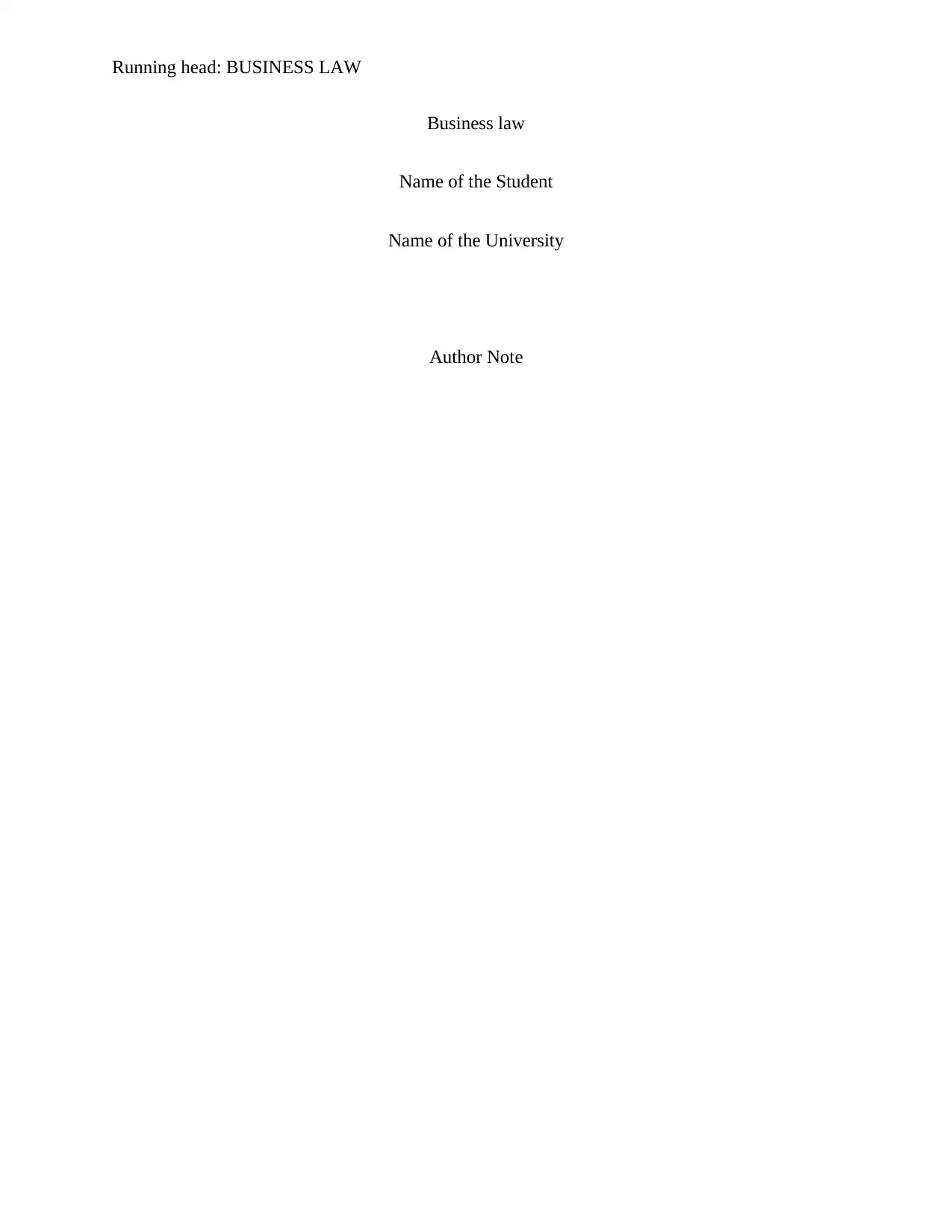
Running head: BUSINESS LAW
Business law
Name of the Student
Name of the University
Author Note
Business law
Name of the Student
Name of the University
Author Note
Paraphrase This Document
Need a fresh take? Get an instant paraphrase of this document with our AI Paraphraser
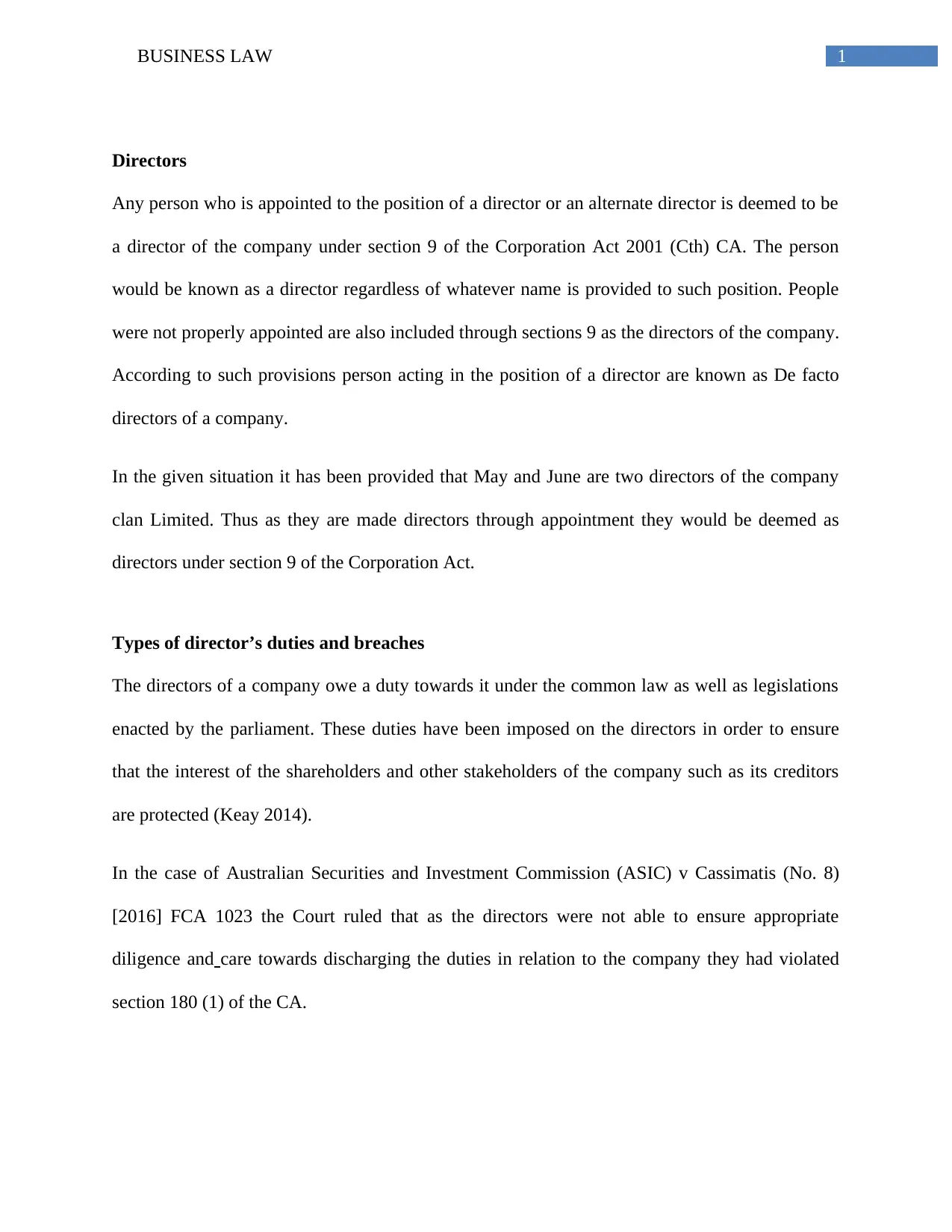
1BUSINESS LAW
Directors
Any person who is appointed to the position of a director or an alternate director is deemed to be
a director of the company under section 9 of the Corporation Act 2001 (Cth) CA. The person
would be known as a director regardless of whatever name is provided to such position. People
were not properly appointed are also included through sections 9 as the directors of the company.
According to such provisions person acting in the position of a director are known as De facto
directors of a company.
In the given situation it has been provided that May and June are two directors of the company
clan Limited. Thus as they are made directors through appointment they would be deemed as
directors under section 9 of the Corporation Act.
Types of director’s duties and breaches
The directors of a company owe a duty towards it under the common law as well as legislations
enacted by the parliament. These duties have been imposed on the directors in order to ensure
that the interest of the shareholders and other stakeholders of the company such as its creditors
are protected (Keay 2014).
In the case of Australian Securities and Investment Commission (ASIC) v Cassimatis (No. 8)
[2016] FCA 1023 the Court ruled that as the directors were not able to ensure appropriate
diligence and care towards discharging the duties in relation to the company they had violated
section 180 (1) of the CA.
Directors
Any person who is appointed to the position of a director or an alternate director is deemed to be
a director of the company under section 9 of the Corporation Act 2001 (Cth) CA. The person
would be known as a director regardless of whatever name is provided to such position. People
were not properly appointed are also included through sections 9 as the directors of the company.
According to such provisions person acting in the position of a director are known as De facto
directors of a company.
In the given situation it has been provided that May and June are two directors of the company
clan Limited. Thus as they are made directors through appointment they would be deemed as
directors under section 9 of the Corporation Act.
Types of director’s duties and breaches
The directors of a company owe a duty towards it under the common law as well as legislations
enacted by the parliament. These duties have been imposed on the directors in order to ensure
that the interest of the shareholders and other stakeholders of the company such as its creditors
are protected (Keay 2014).
In the case of Australian Securities and Investment Commission (ASIC) v Cassimatis (No. 8)
[2016] FCA 1023 the Court ruled that as the directors were not able to ensure appropriate
diligence and care towards discharging the duties in relation to the company they had violated
section 180 (1) of the CA.
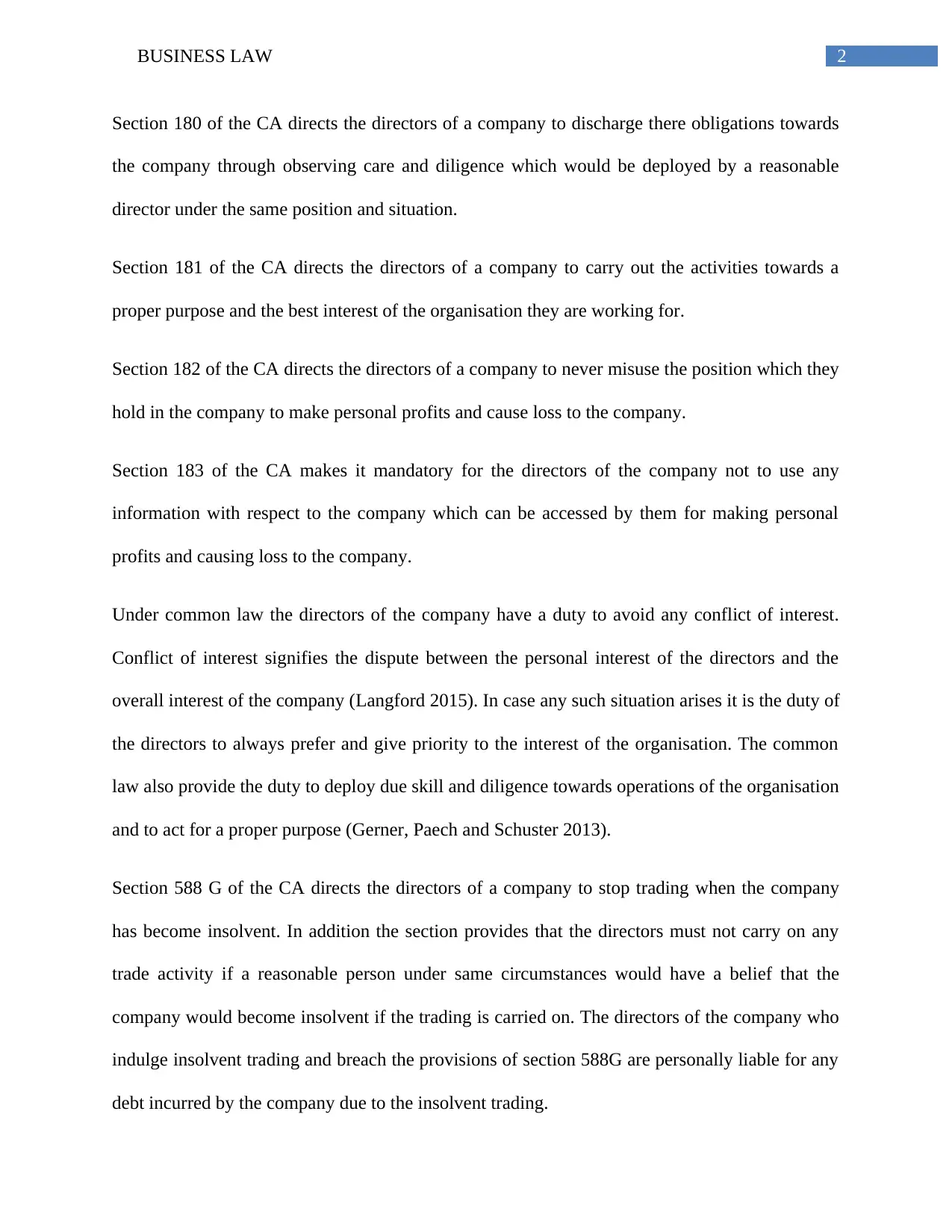
2BUSINESS LAW
Section 180 of the CA directs the directors of a company to discharge there obligations towards
the company through observing care and diligence which would be deployed by a reasonable
director under the same position and situation.
Section 181 of the CA directs the directors of a company to carry out the activities towards a
proper purpose and the best interest of the organisation they are working for.
Section 182 of the CA directs the directors of a company to never misuse the position which they
hold in the company to make personal profits and cause loss to the company.
Section 183 of the CA makes it mandatory for the directors of the company not to use any
information with respect to the company which can be accessed by them for making personal
profits and causing loss to the company.
Under common law the directors of the company have a duty to avoid any conflict of interest.
Conflict of interest signifies the dispute between the personal interest of the directors and the
overall interest of the company (Langford 2015). In case any such situation arises it is the duty of
the directors to always prefer and give priority to the interest of the organisation. The common
law also provide the duty to deploy due skill and diligence towards operations of the organisation
and to act for a proper purpose (Gerner, Paech and Schuster 2013).
Section 588 G of the CA directs the directors of a company to stop trading when the company
has become insolvent. In addition the section provides that the directors must not carry on any
trade activity if a reasonable person under same circumstances would have a belief that the
company would become insolvent if the trading is carried on. The directors of the company who
indulge insolvent trading and breach the provisions of section 588G are personally liable for any
debt incurred by the company due to the insolvent trading.
Section 180 of the CA directs the directors of a company to discharge there obligations towards
the company through observing care and diligence which would be deployed by a reasonable
director under the same position and situation.
Section 181 of the CA directs the directors of a company to carry out the activities towards a
proper purpose and the best interest of the organisation they are working for.
Section 182 of the CA directs the directors of a company to never misuse the position which they
hold in the company to make personal profits and cause loss to the company.
Section 183 of the CA makes it mandatory for the directors of the company not to use any
information with respect to the company which can be accessed by them for making personal
profits and causing loss to the company.
Under common law the directors of the company have a duty to avoid any conflict of interest.
Conflict of interest signifies the dispute between the personal interest of the directors and the
overall interest of the company (Langford 2015). In case any such situation arises it is the duty of
the directors to always prefer and give priority to the interest of the organisation. The common
law also provide the duty to deploy due skill and diligence towards operations of the organisation
and to act for a proper purpose (Gerner, Paech and Schuster 2013).
Section 588 G of the CA directs the directors of a company to stop trading when the company
has become insolvent. In addition the section provides that the directors must not carry on any
trade activity if a reasonable person under same circumstances would have a belief that the
company would become insolvent if the trading is carried on. The directors of the company who
indulge insolvent trading and breach the provisions of section 588G are personally liable for any
debt incurred by the company due to the insolvent trading.
⊘ This is a preview!⊘
Do you want full access?
Subscribe today to unlock all pages.

Trusted by 1+ million students worldwide
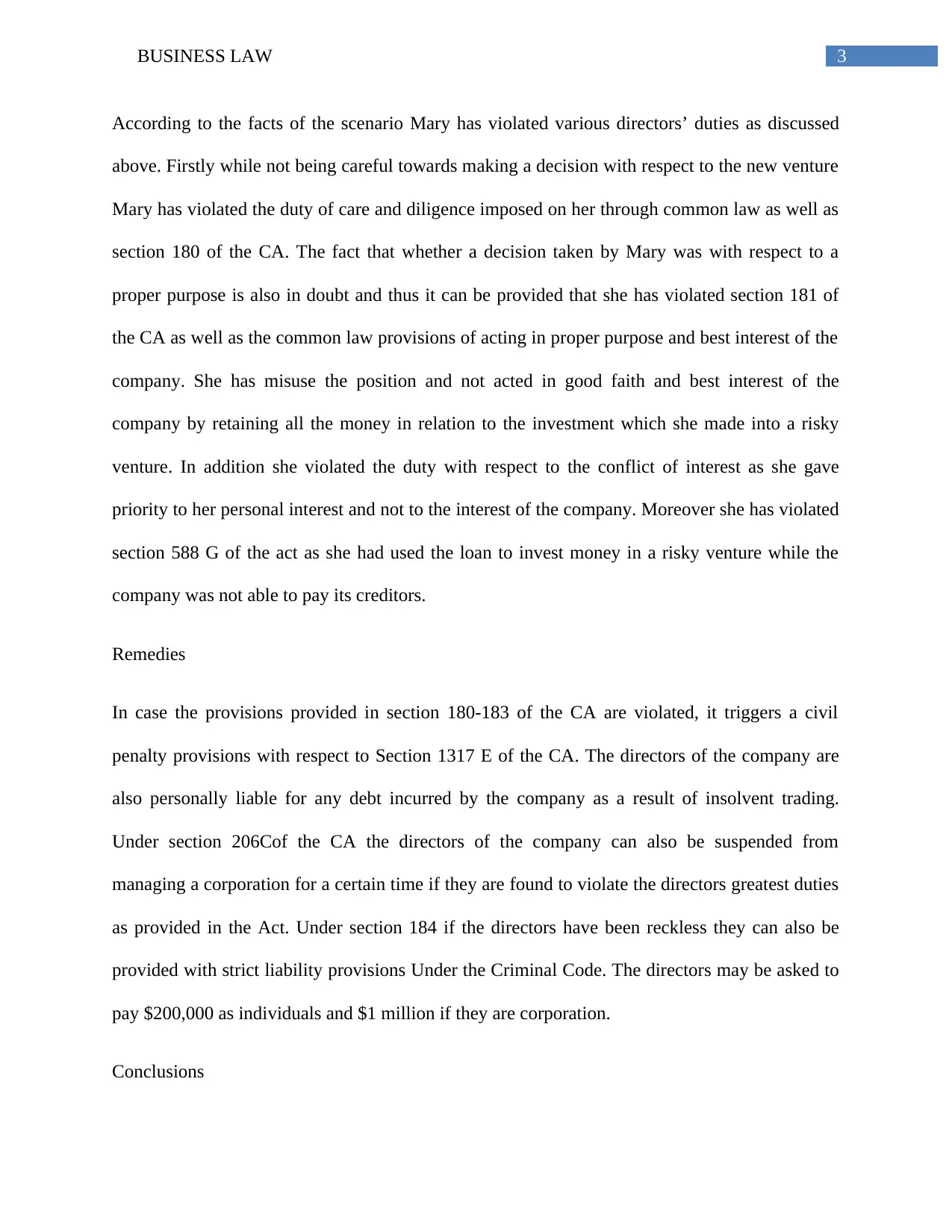
3BUSINESS LAW
According to the facts of the scenario Mary has violated various directors’ duties as discussed
above. Firstly while not being careful towards making a decision with respect to the new venture
Mary has violated the duty of care and diligence imposed on her through common law as well as
section 180 of the CA. The fact that whether a decision taken by Mary was with respect to a
proper purpose is also in doubt and thus it can be provided that she has violated section 181 of
the CA as well as the common law provisions of acting in proper purpose and best interest of the
company. She has misuse the position and not acted in good faith and best interest of the
company by retaining all the money in relation to the investment which she made into a risky
venture. In addition she violated the duty with respect to the conflict of interest as she gave
priority to her personal interest and not to the interest of the company. Moreover she has violated
section 588 G of the act as she had used the loan to invest money in a risky venture while the
company was not able to pay its creditors.
Remedies
In case the provisions provided in section 180-183 of the CA are violated, it triggers a civil
penalty provisions with respect to Section 1317 E of the CA. The directors of the company are
also personally liable for any debt incurred by the company as a result of insolvent trading.
Under section 206Cof the CA the directors of the company can also be suspended from
managing a corporation for a certain time if they are found to violate the directors greatest duties
as provided in the Act. Under section 184 if the directors have been reckless they can also be
provided with strict liability provisions Under the Criminal Code. The directors may be asked to
pay $200,000 as individuals and $1 million if they are corporation.
Conclusions
According to the facts of the scenario Mary has violated various directors’ duties as discussed
above. Firstly while not being careful towards making a decision with respect to the new venture
Mary has violated the duty of care and diligence imposed on her through common law as well as
section 180 of the CA. The fact that whether a decision taken by Mary was with respect to a
proper purpose is also in doubt and thus it can be provided that she has violated section 181 of
the CA as well as the common law provisions of acting in proper purpose and best interest of the
company. She has misuse the position and not acted in good faith and best interest of the
company by retaining all the money in relation to the investment which she made into a risky
venture. In addition she violated the duty with respect to the conflict of interest as she gave
priority to her personal interest and not to the interest of the company. Moreover she has violated
section 588 G of the act as she had used the loan to invest money in a risky venture while the
company was not able to pay its creditors.
Remedies
In case the provisions provided in section 180-183 of the CA are violated, it triggers a civil
penalty provisions with respect to Section 1317 E of the CA. The directors of the company are
also personally liable for any debt incurred by the company as a result of insolvent trading.
Under section 206Cof the CA the directors of the company can also be suspended from
managing a corporation for a certain time if they are found to violate the directors greatest duties
as provided in the Act. Under section 184 if the directors have been reckless they can also be
provided with strict liability provisions Under the Criminal Code. The directors may be asked to
pay $200,000 as individuals and $1 million if they are corporation.
Conclusions
Paraphrase This Document
Need a fresh take? Get an instant paraphrase of this document with our AI Paraphraser
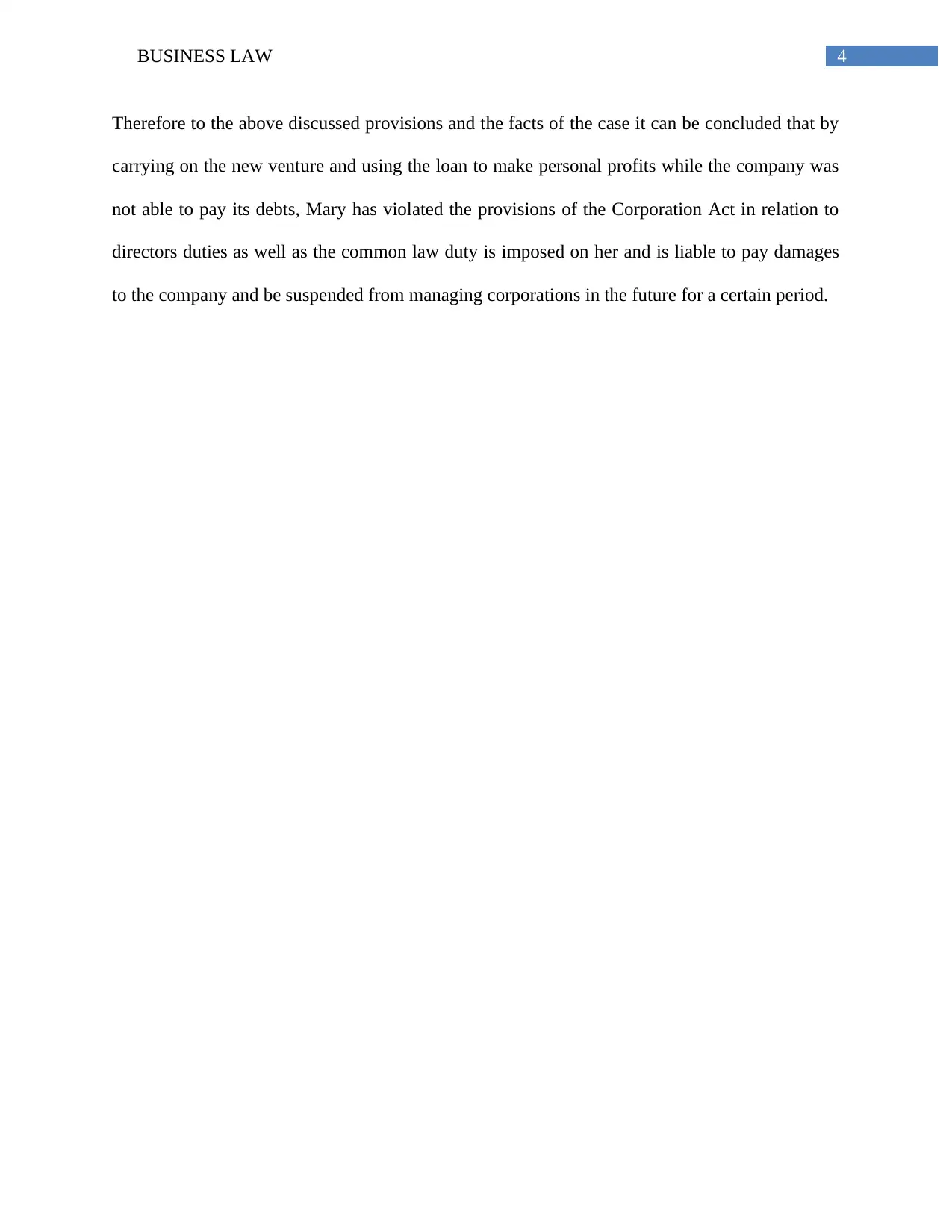
4BUSINESS LAW
Therefore to the above discussed provisions and the facts of the case it can be concluded that by
carrying on the new venture and using the loan to make personal profits while the company was
not able to pay its debts, Mary has violated the provisions of the Corporation Act in relation to
directors duties as well as the common law duty is imposed on her and is liable to pay damages
to the company and be suspended from managing corporations in the future for a certain period.
Therefore to the above discussed provisions and the facts of the case it can be concluded that by
carrying on the new venture and using the loan to make personal profits while the company was
not able to pay its debts, Mary has violated the provisions of the Corporation Act in relation to
directors duties as well as the common law duty is imposed on her and is liable to pay damages
to the company and be suspended from managing corporations in the future for a certain period.
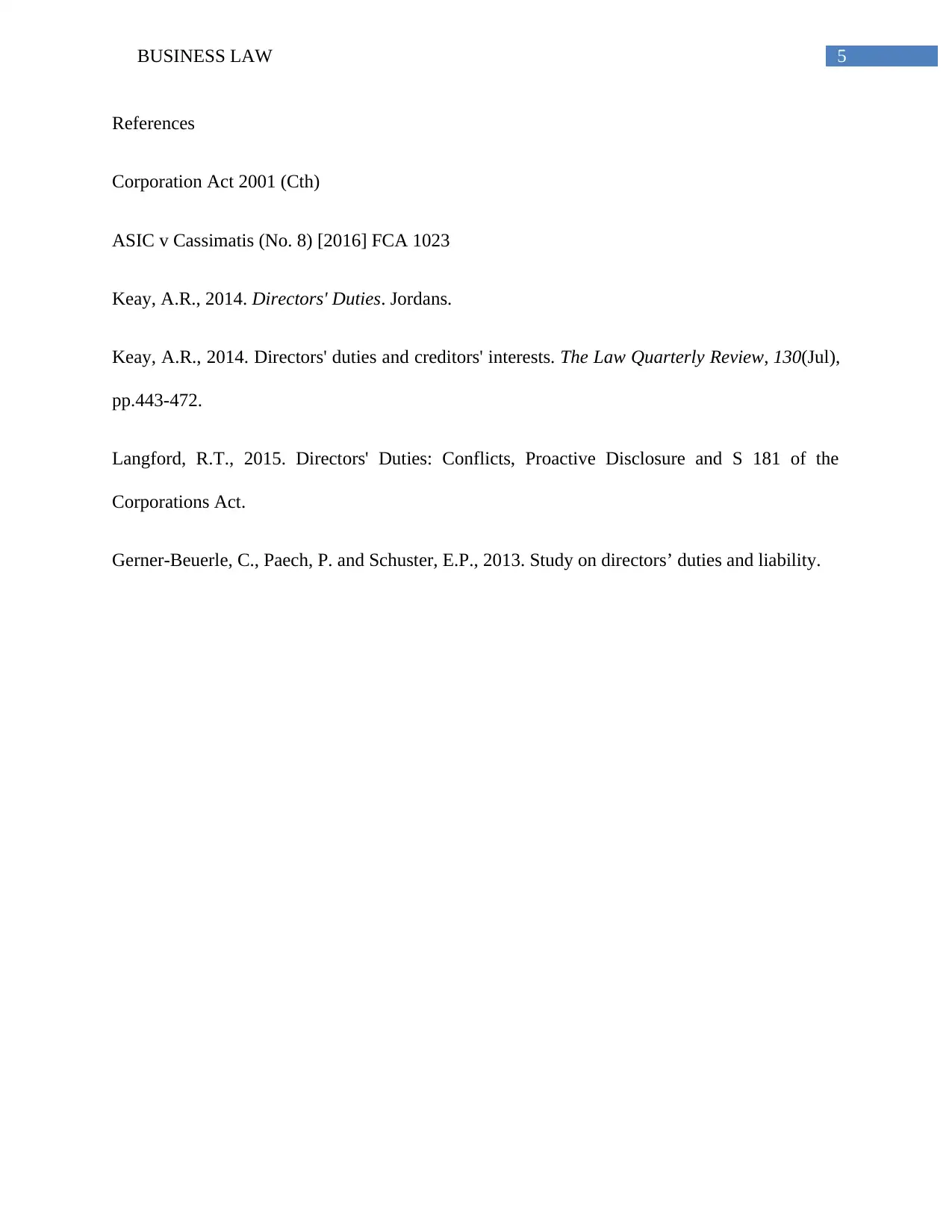
5BUSINESS LAW
References
Corporation Act 2001 (Cth)
ASIC v Cassimatis (No. 8) [2016] FCA 1023
Keay, A.R., 2014. Directors' Duties. Jordans.
Keay, A.R., 2014. Directors' duties and creditors' interests. The Law Quarterly Review, 130(Jul),
pp.443-472.
Langford, R.T., 2015. Directors' Duties: Conflicts, Proactive Disclosure and S 181 of the
Corporations Act.
Gerner-Beuerle, C., Paech, P. and Schuster, E.P., 2013. Study on directors’ duties and liability.
References
Corporation Act 2001 (Cth)
ASIC v Cassimatis (No. 8) [2016] FCA 1023
Keay, A.R., 2014. Directors' Duties. Jordans.
Keay, A.R., 2014. Directors' duties and creditors' interests. The Law Quarterly Review, 130(Jul),
pp.443-472.
Langford, R.T., 2015. Directors' Duties: Conflicts, Proactive Disclosure and S 181 of the
Corporations Act.
Gerner-Beuerle, C., Paech, P. and Schuster, E.P., 2013. Study on directors’ duties and liability.
⊘ This is a preview!⊘
Do you want full access?
Subscribe today to unlock all pages.

Trusted by 1+ million students worldwide
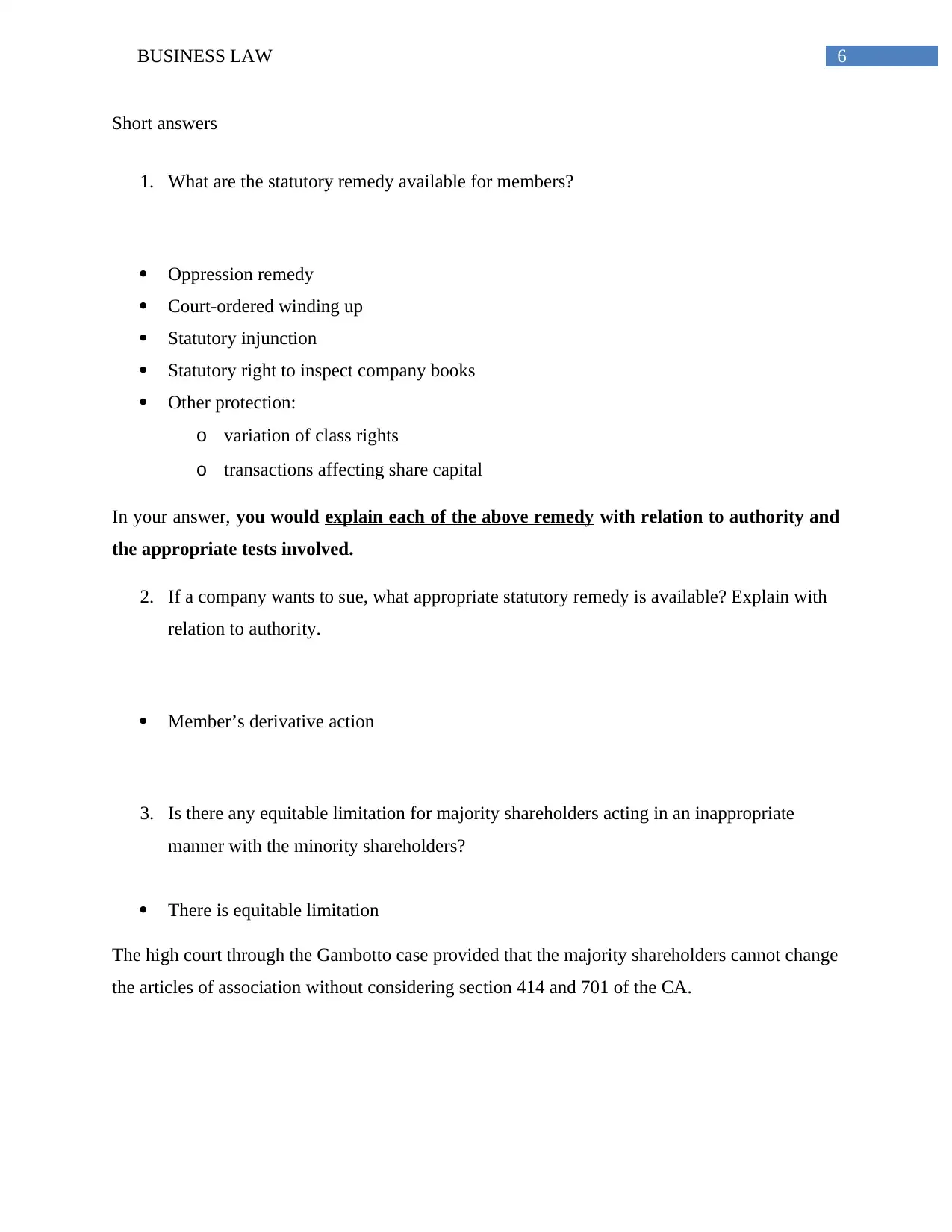
6BUSINESS LAW
Short answers
1. What are the statutory remedy available for members?
Oppression remedy
Court-ordered winding up
Statutory injunction
Statutory right to inspect company books
Other protection:
o variation of class rights
o transactions affecting share capital
In your answer, you would explain each of the above remedy with relation to authority and
the appropriate tests involved.
2. If a company wants to sue, what appropriate statutory remedy is available? Explain with
relation to authority.
Member’s derivative action
3. Is there any equitable limitation for majority shareholders acting in an inappropriate
manner with the minority shareholders?
There is equitable limitation
The high court through the Gambotto case provided that the majority shareholders cannot change
the articles of association without considering section 414 and 701 of the CA.
Short answers
1. What are the statutory remedy available for members?
Oppression remedy
Court-ordered winding up
Statutory injunction
Statutory right to inspect company books
Other protection:
o variation of class rights
o transactions affecting share capital
In your answer, you would explain each of the above remedy with relation to authority and
the appropriate tests involved.
2. If a company wants to sue, what appropriate statutory remedy is available? Explain with
relation to authority.
Member’s derivative action
3. Is there any equitable limitation for majority shareholders acting in an inappropriate
manner with the minority shareholders?
There is equitable limitation
The high court through the Gambotto case provided that the majority shareholders cannot change
the articles of association without considering section 414 and 701 of the CA.
1 out of 7
Related Documents
Your All-in-One AI-Powered Toolkit for Academic Success.
+13062052269
info@desklib.com
Available 24*7 on WhatsApp / Email
![[object Object]](/_next/static/media/star-bottom.7253800d.svg)
Unlock your academic potential
Copyright © 2020–2026 A2Z Services. All Rights Reserved. Developed and managed by ZUCOL.





